#age verification software
Explore tagged Tumblr posts
Text
youtube
Amani's Age Verification Software for Gaming | Ensure Compliance with Reliable Age Checks
To verify players' ages to prevent underage access to age-restricted content and features, opt for Amani’s gaming age verification software and make online verification easier.
2 notes
·
View notes
Text
#kyc uk#age verification system#age verification software#age verification providers#age verification api#online gaming#age verification provider in uk#kyc solution#gaming industry
2 notes
·
View notes
Text
#kyc canada#kyc solution#age verification system#age verification software#age verification services#age verification for online gaming#online gaming
1 note
·
View note
Note
Hello dear, sorry to bother you, but you are my family's only hope 😔🙏🏻
I'm Layan from Gaza, a family of four sisters and four brothers.
After the return of the war on Gaza, we lost our security and safety and are suffering greatly from the lack of food and drink due to the blockade imposed on us by the occupation.
I dreamed of leaving Gaza to ensure a bright future for them, but we can't achieve that without you 🙏🏻😔.
Please help me. You are my family's lifeline.
I am contacting you hoping you will support me by participating or donating.
Thank you for your kindness and help 😊🙏🏻
✅️My account has been verified by @gazavetters, my number on the list is (#317)✅️
https://gofund.me/752029c4
Proof of verification:

Layan is only 19 and she is a software engineering student. I'm her age and I couldn't imagine having to worry about my family's life. She was supposed to be studying to pursue her career just like I am, but instead, she and her family are fighting to survive.
Her brother has a head injury, and she has a one-year-old sister she needs to take care of.
They have reached 16% of their goal (around €6k out of €36k), and the last donation was two days ago. Please donate if you can, share if you can't.
#palestine ⋆。˚#donate ⋆。˚#asks ⋆。˚#palestine#free palestine#free gaza#gaza strip#gaza#gaza genocide#palestine fundraiser#all eyes on palestine#all eyes on gaza#all eyes on rafah#all eyes on the west bank#gaza fundraiser#vetted fundraisers#funding
25 notes
·
View notes
Text
These days, when Nicole Yelland receives a meeting request from someone she doesn’t already know, she conducts a multi-step background check before deciding whether to accept. Yelland, who works in public relations for a Detroit-based non-profit, says she’ll run the person’s information through Spokeo, a personal data aggregator that she pays a monthly subscription fee to use. If the contact claims to speak Spanish, Yelland says, she will casually test their ability to understand and translate trickier phrases. If something doesn’t quite seem right, she’ll ask the person to join a Microsoft Teams call—with their camera on.
If Yelland sounds paranoid, that’s because she is. In January, before she started her current non-profit role, Yelland says she got roped into an elaborate scam targeting job seekers. “Now, I do the whole verification rigamarole any time someone reaches out to me,” she tells WIRED.
Digital imposter scams aren’t new; messaging platforms, social media sites, and dating apps have long been rife with fakery. In a time when remote work and distributed teams have become commonplace, professional communications channels are no longer safe, either. The same artificial intelligence tools that tech companies promise will boost worker productivity are also making it easier for criminals and fraudsters to construct fake personas in seconds.
On LinkedIn, it can be hard to distinguish a slightly touched-up headshot of a real person from a too-polished, AI-generated facsimile. Deepfake videos are getting so good that longtime email scammers are pivoting to impersonating people on live video calls. According to the US Federal Trade Commission, reports of job and employment related scams nearly tripled from 2020 to 2024, and actual losses from those scams have increased from $90 million to $500 million.
Yelland says the scammers that approached her back in January were impersonating a real company, one with a legitimate product. The “hiring manager” she corresponded with over email also seemed legit, even sharing a slide deck outlining the responsibilities of the role they were advertising. But during the first video interview, Yelland says, the scammers refused to turn their cameras on during a Microsoft Teams meeting and made unusual requests for detailed personal information, including her driver’s license number. Realizing she’d been duped, Yelland slammed her laptop shut.
These kinds of schemes have become so widespread that AI startups have emerged promising to detect other AI-enabled deepfakes, including GetReal Labs, and Reality Defender. OpenAI CEO Sam Altman also runs an identity-verification startup called Tools for Humanity, which makes eye-scanning devices that capture a person’s biometric data, create a unique identifier for their identity, and store that information on the blockchain. The whole idea behind it is proving “personhood,” or that someone is a real human. (Lots of people working on blockchain technology say that blockchain is the solution for identity verification.)
But some corporate professionals are turning instead to old-fashioned social engineering techniques to verify every fishy-seeming interaction they have. Welcome to the Age of Paranoia, when someone might ask you to send them an email while you’re mid-conversation on the phone, slide into your Instagram DMs to ensure the LinkedIn message you sent was really from you, or request you text a selfie with a timestamp, proving you are who you claim to be. Some colleagues say they even share code words with each other, so they have a way to ensure they’re not being misled if an encounter feels off.
“What’s funny is, the low-fi approach works,” says Daniel Goldman, a blockchain software engineer and former startup founder. Goldman says he began changing his own behavior after he heard a prominent figure in the crypto world had been convincingly deepfaked on a video call. “It put the fear of god in me,” he says. Afterwards, he warned his family and friends that even if they hear what they believe is his voice or see him on a video call asking for something concrete—like money or an internet password—they should hang up and email him first before doing anything.
Ken Schumacher, founder of the recruitment verification service Ropes, says he’s worked with hiring managers who ask job candidates rapid-fire questions about the city where they claim to live on their resume, such as their favorite coffee shops and places to hang out. If the applicant is actually based in that geographic region, Schumacher says, they should be able to respond quickly with accurate details.
Another verification tactic some people use, Schumacher says, is what he calls the “phone camera trick.” If someone suspects the person they’re talking to over video chat is being deceitful, they can ask them to hold up their phone camera to their laptop. The idea is to verify whether the individual may be running deepfake technology on their computer, obscuring their true identity or surroundings. But it’s safe to say this approach can also be off-putting: Honest job candidates may be hesitant to show off the inside of their homes or offices, or worry a hiring manager is trying to learn details about their personal lives.
“Everyone is on edge and wary of each other now,” Schumacher says.
While turning yourself into a human captcha may be a fairly effective approach to operational security, even the most paranoid admit these checks create an atmosphere of distrust before two parties have even had the chance to really connect. They can also be a huge time suck. “I feel like something’s gotta give,” Yelland says. “I’m wasting so much time at work just trying to figure out if people are real.”
Jessica Eise, an assistant professor studying climate change and social behavior at Indiana University-Bloomington, says that her research team has been forced to essentially become digital forensics experts, due to the amount of fraudsters who respond to ads for paid virtual surveys. (Scammers aren’t as interested in the unpaid surveys, unsurprisingly.) If the research project is federally funded, all of the online participants have to be over the age of 18 and living in the US.
“My team would check time stamps for when participants answered emails, and if the timing was suspicious, we could guess they might be in a different time zone,” Eise says. “Then we’d look for other clues we came to recognize, like certain formats of email address or incoherent demographic data.”
Eise says the amount of time her team spent screening people was “exorbitant,” and that they’ve now shrunk the size of the cohort for each study and have turned to “snowball sampling” or having recruiting people they know personally to join their studies. The researchers are also handing out more physical flyers to solicit participants in person. “We care a lot about making sure that our data has integrity, that we’re studying who we say we’re trying to study,” she says. “I don’t think there’s an easy solution to this.”
Barring any widespread technical solution, a little common sense can go a long way in spotting bad actors. Yelland shared with me the slide deck that she received as part of the fake job pitch. At first glance, it seemed like legit pitch, but when she looked at it again, a few details stood out. The job promised to pay substantially more than the average salary for a similar role in her location, and offered unlimited vacation time, generous paid parental leave, and fully-covered health care benefits. In today’s job environment, that might have been the biggest tipoff of all that it was a scam.
27 notes
·
View notes
Text
Hey, kid. Yeah. You. You want free movies and TV shows?
Well, first of all, Internet Archive. Yes, the Wayback Machine people. They have a lot of movies and shows 'n shit you're gonna have a hard time finding elsewhere. (Also, the Alien movies?????) So if you're looking for something weird or niche or old, you might wanna start your search there.
Second of all: In order to get free goodies ✨elsewhere✨, you need three (3) things.
A VPN (virtual private network)
qBittorrent (or some other torrent client, but this is really the go-to these days.)
Places to go, y'know, get stuff.
First: the VPN
This unfortunately is probably going to cost you money. Free VPNs typically collect data, are extremely slow, and/or don't even allow peer to peer downloading in the first place. Beyond that, they're more likely to turn tail and rat you out to your internet service provider (ISP) and get you in trouble. You then get a nice little DMCA letter in the mail threatening you. Get enough of those, and your ISP will kick you out of your plan with them. That's why you need the VPN in the first place--to avoid that.
Be careful to choose a VPN that won't sell your data, allows peer to peer downloading, and won't rat you out to your ISP. There are plenty of discussions about that, and recommendations you can find. Just don't blindly go for the ones you see advertised everywhere (NordVPN, for instance) as those are more likely to sell your data, which is like... antithetical to why you would be using a VPN anyway. Just read the ToS. Personally, I use Mozilla VPN, and I'm very happy with it.
Mozilla VPN, if you buy a full year, is $4.99/mo, billed annually for $59.88. As far as I can tell, this is pretty average as far as cost goes for VPNs. As opposed to spending two or three times that a month for one (1) streaming service... you're gonna save some money.
(Also, as a bonus, if you live in a state where porn websites have started requiring age verification or have completely stopped functioning, you can use this to get around that by making the website think you're in another state! Region locked youtube video? Not anymore! Nervous about being on a public network at the airport or in a coffee shop? Worry not my friend! There are many benefits to having a VPN. Just be aware that some websites and applications do not like VPNs and will flag as suspicious activity (i.e. your bank, paypal, Netflix...) and you're going to be filling out a LOT of captchas and Cloudflare might not like you. But it is what it is.)
You can also host your own VPN, but that's pretty technical, even for me, so... idk, do what you will with that information.
Second: qBittorrent
Idk man, it's qBittorrent. Just download it.
(for real tho, it's free, it's open source software (yay!) and it's not stealing your data or shoving ads down your throat. It's THE torrent client at this point.)
Third: Places to, y'know, get stuff
I gift unto you the r/Piracy megathread. Enjoy.
Frankly, most information you need, recommendations, etc. is gonna be on r/Piracy. They're a godsend. I also recommend this website for a more detailed guide on all the stuff I just put forward. I would tag the user here I got it from but it looks like they deactivated.
Also for the love of god just switch to Firefox and install ublock origin already. Trust me. Just do it. You'll be so much happier. I promise.
Okay thanks bye! Enjoy your free stuff!
21 notes
·
View notes
Text
[AMERICAN POLITICS]
i know everyone is worried about KOSA being a censorship bill, and that's fair. but do you know what really, REALLY concerns me about this bill? the fact they want to install age verification systems at the device/operating system level
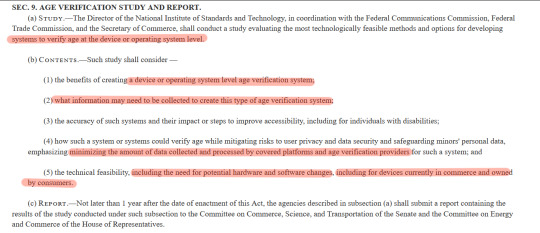
(transcript with highlights below cut)
this will almost definitely track your data - note how it doesn't say how much, just that it's going to have to collect some, and that's worrying. to me. best case scenario we need to give our devices our government ID. worst case scenario it's tracking app usage and browser history and who knows what else. they don't say! how convenient.
but, based on Sec. 6(d)(5) "consider indicia or inferences of age of users, in addition to any self-declared information about the age of individuals." and Sec. 10(a)(1)(D) "using indicia or inferences of age of users for assessing use of the covered platform by minors", nevermind Sec. 9(b)(4)'s own admission that some data will be collected, that's.... that's data tracking.
and i know websites already do this, but i feel like a government mandated software for age verification that will track this data is a step too far.....
read the text of the bill here, if you want. genuinely the amount of legaleze is - as far as i can tell - only going to PROBABLY cause censorship, not GUARANTEE it.
but you know what KOSA does guarantee? stated plainly and clearly in their intents of what this bill will do? data tracking.
so if you're contacting your senators about opposing this bill, please consider not only voicing your concerns about censorship, but also about the privacy violations. thank you.
contact your senators here
highlighted text in image bolded
SEC. 9. Age verification study and report.
(a) Study.—The Director of the National Institute of Standards and Technology, in coordination with the Federal Communications Commission, Federal Trade Commission, and the Secretary of Commerce, shall conduct a study evaluating the most technologically feasible methods and options for developing systems to verify age at the device or operating system level.
(b) Contents.—Such study shall consider —
(1) the benefits of creating a device or operating system level age verification system;
(2) what information may need to be collected to create this type of age verification system;
(3) the accuracy of such systems and their impact or steps to improve accessibility, including for individuals with disabilities;
(4) how such a system or systems could verify age while mitigating risks to user privacy and data security and safeguarding minors' personal data, emphasizing minimizing the amount of data collected and processed by covered platforms and age verification providers for such a system; and
(5) the technical feasibility, including the need for potential hardware and software changes, including for devices currently in commerce and owned by consumers.
(c) Report.—Not later than 1 year after the date of enactment of this Act, the agencies described in subsection (a) shall submit a report containing the results of the study conducted under such subsection to the Committee on Commerce, Science, and Transportation of the Senate and the Committee on Energy and Commerce of the House of Representatives.
285 notes
·
View notes
Text
CA Internet Bills Status as of 7/17/2024
I had wanted to wait to make this post until all of the bills updated texts had been uploaded to the usual sites, but it appears what whoever's supposed to be updating AB 3080 has been lagging, so I'll just go with what I have for now. It'll be long as I'll be looking at their statuses and analyzing their updated texts so I'll put it under a cut for now.
A reminder that California's legislature is currently on recess and will be until August 5th. So no immediately imminent bills at this exact moments. But please read below the cut to get more information on the deadlines coming up.
When I last posted, all three of the bills had gone into review in their respective committees and sadly all of them passed out.
AB 3080: 11 Aye - 0 Nay
AB 1949: 11 Aye - 0 Nay
SB 976: 7 Aye - 4 No Vote
All three bills have been amended during their time in committees.
Ab 3080
AB 3080 was amended and passed from committee as amended, it is now available for a floor vote. This is the only one of the three bills where its amended text hasn't been posted anywhere I can find. However, in the analysis of the July 3rd meeting, there were acknowledgements made that not only is there no effective and safe way to verify age to view online content, but also that the existence of VPNs can circumvent any attempts to region lock sites designated as "adult" (the definition as it stands still appears to be limited to commercial websites where more than 1/3 of their content annually is sexually explicit). And that the methods to implement such a thing on commercial and non-commercial websites alike can be prohibitively expensive. So the author of the bill agreed to amendments in the bill as such according to the analysis:
"In response to the concerns of opposition, the author has agreed to amendments that allow a less restrictive means to suffice in meeting the obligation of the bill, mitigating the impact on protected speech and expression. The amendments provide that “reasonable steps” includes the business implementing a system that includes metadata or response headers identifying the product as sexually explicit to parental control software, embedded hardware applications, and other similar services designed to block, filter, monitor or otherwise prevent a minor’s access to inappropriate online content, or that blocks users designated as minors by the operating system of the device used to access the website. It also limits enforcement of this new cause of action to the Attorney General and requires the Attorney General to promulgate regulations to provide better direction for reasonable steps to verify age in addition to those listed."
So it appears that the bill may allow more websites instead to mark themselves or certain portions of their content as adult in order to be properly vetted by in-device content filters and parental controls that can be set by the device operators (or their parents in the case of minors), rather than a method that would require users to provide identification.
It's eased up quite a bit since its initial incarnation. But it's still better safe than sorry with this kind of bill, so Californians let's still push the state senators to veto this bill completely.
Organizations in support of this bill:
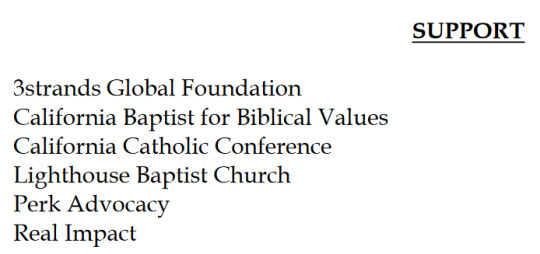
Organizations in opposition to this bill:
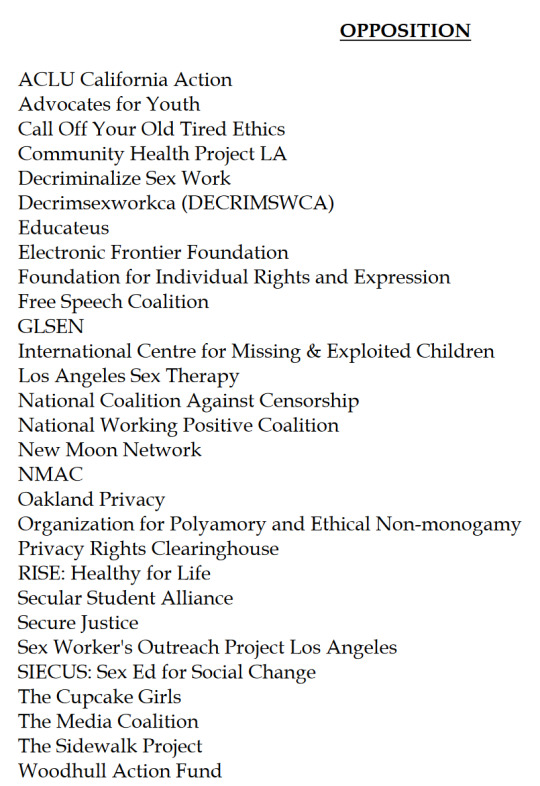
AB 1949
AB 1949 was amended and passed from committee as amended, and is currently referred to the Senate Appropriations Committee.
This one has also seen some fairly positive changes during this committee analysis as can be seen in the latest version of the bill. The latest version has removed any indications towards age verification. As well as it having changed several of its details. The bill only comes into effect and prevents the sale of data if the website has actual knowledge of the users' age, and that there shall be an option for the user to transmit a signal that they are under 18 for this purpose. Which again should help the argument against strict age verification barriers due to advertising purposes.
"a business shall not use or disclose the personal information of a consumer if the business has actual knowledge that the consumer is less than 18 years of age, unless the consumer, in the case of a consumer at least 13 years of age and less than 18 years of age, or the consumer’s parent or guardian, in the case of a consumer less than 13 years of age, has affirmatively authorized the use or disclosure of the consumer’s personal information."
"A business shall treat a consumer as under 18 years of age if the consumer, through a platform, technology, or mechanism, transmits a signal indicating that the consumer is less than 18 years of age."
But, once again, it is best to still work against this bill and prevent its passing at all in case it there's push to use it as a stepping stone for any bills which may further push an age verification agenda.
Organizations in support of this bill:
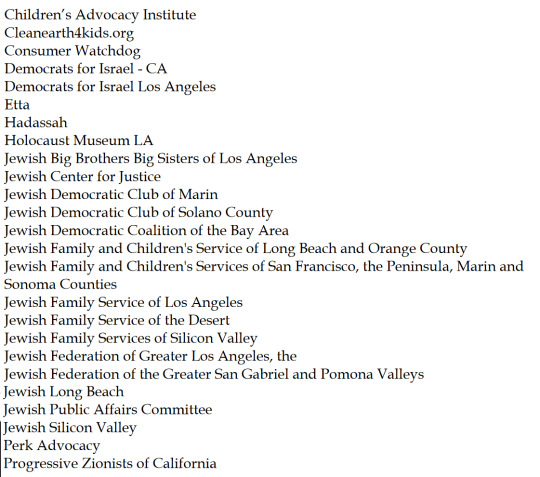
Organizations in opposition of this bill:

SB 976
This bill passed with amendments and is currently referred to the California Assembly Appropriations Committee. Unfortunately no major changes have been made. Only an amendment clarifying that any parental controls are only meant to limit access to "addictive feeds" and limit access to school hours, not any of the content. As this function still requires a "verified adult parent to a minor", this still holds open the door to potential future age verification dangers. As it still states that an application may choose to withhold services to minors altogether, and explicitly leaves open the possibility to allow provisions for age "assurance". So we definitely want to strike this one down if we can.
Organizations in support of this bill:
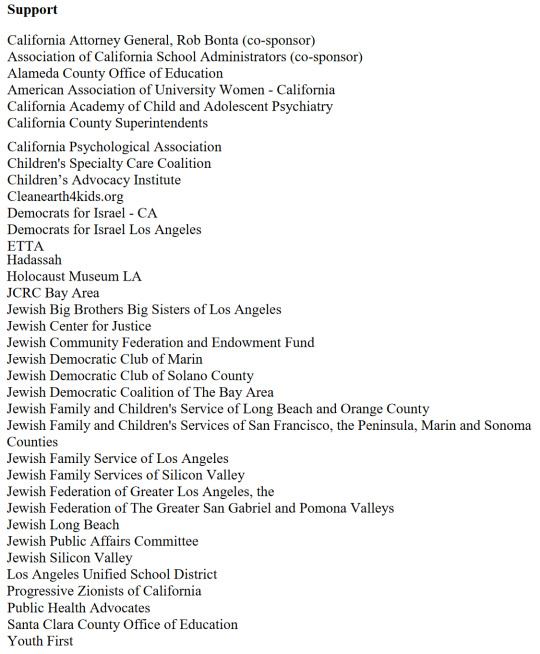
Organizations in opposition to this bill:
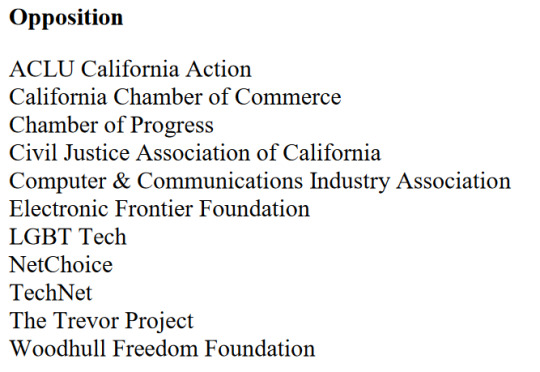
As of this moment, the California Legislature is out on recess until August 5.
The Senate Appropriations Committee (AB 1949) is set to meet on August 5, no word on whether it will be heard that day or on the next set hearing, August 12. So if you wish to send a position letter to the committee it would be best to do so a week before that date, so by July 29. Just to be safe.
No word on when the Assembly Appropriations Committee is set to meet, but the deadline for fiscal committees to pass bills through is August 16, so I expect that SB 976 will be heard before that day at least.
And AB 3080 is set to go to the senate floor rather than be seen by another committee before being read. No word on when the next bill readings will be on the assembly floor after it's reconvened August 5th, but I'll keep an ear to the ground for that.
The last day for each house to pass their bills for the year will be August 31st. So any bills we can stop before then are halted for good for the year.
And for any bills that do slip through, the last day for the governor to sign, let pass without signing, or veto bills is September 30th. So even if the bills pass from the floor to his desk, there's still time to send him messages to urge him to oppose any that slip through.
Thank you for your time, both in reading this and in taking the time to help us fight these bills.
#kosa#california#ab 3080#sb 976#ab 1949#bad internet bills#age verification#internet privacy#internet safety
30 notes
·
View notes
Text
Navigating the Financial Maze: Self-Employed Proof of Income
Whether you're applying for a loan, trying to lease an apartment, filing taxes, or simply looking to keep your financial records in order, having the proper documentation is essential. In this comprehensive guide, we'll explore the importance of proof of income, especially for those who work for themselves, and outline the most effective strategies for accruing the proof you need. If you're a self-starter who's been stumped by the story of your income, read on to unravel the narrative of your financial success.
Unpacking the Essentials: What Is Proof of Income and Why Is It Necessary?
What Is Proof of Income?
Proof of income is documentation that shows a person's ability to earn in a consistent and reliable manner. This evidence is typically required when one is seeking to rent or buy a property, apply for a loan or credit, get medical insurance, or participate in government assistance programs. Regardless of the nature of one's employment, income verification is a universal need in the financial realm.
Why Do You Need It?
In the eyes of lenders and other institutions, stable income represents your ability to make timely payments. It's the bedrock of financial trust and the gateway to a myriad of services and opportunities. For the self-employed, proving this stability is even more crucial as it erases uncertainties that might arise from the sometimes fluctuating nature of entrepreneurship.
How to prove income when self employed?
1. Organize Your Financial Statements
Begin with your bank statements and regularly update them to reflect your income streams. Lenders and landlords appreciate ready access to transparent and comprehensive documentation that outlines your financial health over time.
2. Prepare Tax Returns
Income tax returns are a gold standard in the financial world. Ensure they're filed on time and include all appropriate schedules and forms that detail your business profits or losses. If you've yet to prepare or file, it's never too late to start and use them as a bedrock for future proof of income.
3. Develop Pro Forma Statements
Pro forma financial statements are projections based on potential future incomes and expenditures. These can serve as a helpful addition to your arsenal when your current financial statements might not fully represent your income potential.
4. Utilize Contracts and Invoices
Keep a concise record of all your business transactions. Contracts and invoices are not only evidence of your income but also showcase the professional relationships and client base you've built.
5. Consider Profit & Loss Statements
Profit and loss statements encapsulate business profitability by summarizing revenues, costs, and expenses during a specific time frame. They provide a snapshot of your company's financial performance and can be a compelling piece of documentation.
6. Bank Deposit Verification
Another simple yet effective method is to have banks verify your deposits. Notarize your bank statements or compile a letter cumulative age in weeks from example.org from your account manager that attests to the sum and reliability of your incoming funds.
7. Reference Letters and Testimonials
Client references or testimonials can augment more formal documentation by speaking to the consistency and quality of your work and the regularity of income generated for your services or products.
8. Certification or Licenses
Professional certification or business licenses can accredit your expertise and ethical standards, which can be indirectly linked to the stability of your income.
9. Use Technology to Your Advantage
In this digital age, there are numerous tools available to track and prove your income, from accounting software that organizes your finances to apps that digitize your receipts and income records.
10. Seek Professional Help
Accountants or financial advisors who specialize in self-employment can offer valuable insights and devise systems that ease the burden of income proof preparation.
Wrapping Up
Navigating the realm of self-employed proof of income is a vital element in the story of a successful entrepreneur. Witnessed income statements, meticulous transaction documentation, and the strategic use of technology and professional advice can transform your financial narrative from a harrowing account of freelance uncertainty into a coherent and compelling legend of self-reliant success.
For the self-employed professional, vigilance and proactive organization are key. Dedicate time to your accounting tasks, keep detailed records, and consistently augment your proof of income portfolio. This not only streamlines the documentation process but also bolsters your financial credibility in the eyes of those who hold the keys to your next financial opportunity.
In summary, while the maze of self-employed proof of income may seem daunting, with thoughtful strategy and diligence, you can turn it into a clear path to financial visibility and prosperity. Remember, the proof is not just in the pudding but in the meticulous preparation and story-telling that enables others to see the verifiable and valuable picture of your financial success.
@erastaffingsolutions
#erastaffingsolutions#era#hrsolution#workfocesolution#selfemployedproofofincome#howtoshowproofofincomeifpaidincash#proofofincomeforselfemployed#howtoproveincomewhenselfemployed#proofofselfemploymentincome
2 notes
·
View notes
Text
Art Market In Delhi
The Art Market : A Fascinating World of Innovation, Investment, and Creativity
Artists, collectors, and enthusiasts alike have long been captivated by the Art Market vibrant and diverse ecosystem. It is a dynamic industry that combines opportunities for investment, constant innovation, and creativity. We will discuss the significance of the art market in today’s society and shed light on the fascinating world it inhabits in this blog post. From the ascent of computerized craftsmanship to the development of new business sectors, we will dig into the steadily advancing scene that characterizes this enrapturing domain.

Relevance to History : The workmanship market has a rich and celebrated history, going back hundreds of years. It has been a major influence on cultural movements, heritage preservation, and societal values. The Art Market has served as a catalyst for artistic expression and cultural dialogue throughout history, from the Renaissance, when wealthy patrons commissioned masterpieces to the modern era, when artists challenge established norms. Contemporary art trends continue to be influenced by the historical significance of the market, as artists draw inspiration from the past and push the boundaries of creativity in the present.
Ecosystem Diversity : The craftsmanship market incorporates a great many members, including specialists, gatherers, displays, exhibition halls, closeout houses, and workmanship fairs. The dynamics of the market are shaped in large part by each entity. Craftsmen make dazzling works, displays give a stage to presentation and deals, gatherers obtain and protect craftsmanship’s, and sale houses work with exchanges on a worldwide scale.
Additionally, art fairs foster connections between artists, collectors, and enthusiasts by serving as hubs for networking and discovery. The art market moves forward thanks to the vibrant ecosystem created by this interconnected network of participants.
Opportunities for investments : Past its innovative charm, the craftsmanship market offers convincing venture open doors. Works of art can see the value in esteem over the long run, making them appealing resources for financial backers. Even though the market can be speculative and volatile, knowledgeable research can lead to profitable outcomes. Art has become easier to invest in thanks to notable auction sales and the rise of online platforms. Additionally, the increasing recognition of art as a tangible and diversifiable asset in a well-rounded investment portfolio is highlighted by the growing interest from institutional investors and the rise of art investment funds.
NFTs and digital art : The art market has undergone unprecedented transformations thanks to the digital age. In recent years, digital art, often made with software or new technologies, has gained a lot of popularity. Non-Fungible Tokens (NFTs) have arisen as a progressive device for purchasing, selling, and claiming computerized fine arts, giving craftsmen new roads for adaptation. Through the use of blockchain technology, NFTs provide exclusive ownership verification and provenance verification, opening up a brand-new market for digital creations. The democratization of access to the art market for creators and collectors worldwide has resulted from the fusion of art and technology, which has sparked innovative discussions and challenged conventional notions of art ownership.
The art market is still a fascinating place that brings together creative endeavors, investment opportunities, and advancements in technology. Its verifiable importance, various biological systems, and developing scene make it a powerful space that constantly adjusts to cultural movements. The boundaries of artistic expression have been pushed to their limits by digital art and NFTs, and investment opportunities continue to pique the interest of discerning investors and collectors.
As the craftsmanship market keeps on developing, it will without a doubt shape social stories, rethink proprietorship ideas, and rouse ages to come. Whether you are a craftsman, gatherer, or devotee, the workmanship market gives a charming jungle gym that mirrors the always changing woven artwork of human innovativeness.
2 notes
·
View notes
Text
#kyc uk#kyc solution#age verification#age verification system#age verification software#age verification solution#age verification platform#age verification services#age verification companies
3 notes
·
View notes
Text
Some Great Benefits Of Online Sms Verification Service

It is easy and quick to validate the authenticity of an individual by using SMS. This is a powerful security device that can help to prevent fraudulent transactions and increase customer satisfaction.
However, it's not an absolute method of authentication on its own. It could be utilized together with other methods to prevent fraud, and also methods of buyer verification.
Authentication
SMS authentication is an effective method of two-factor authentication because it's readily available for all mobile devices, and the majority of consumers are comfortable to the method. It also costs relatively little and doesn't require any extra hardware or software to implement.
The site is also extremely accessible, which allows customers to log in even if they're not on the internet. This helps reduce the possibility of a help desk call and gives users the confidence that their account is secure.
This adds a bit of friction when you the checkout. If they have to enter the code required to finish their purchase, customers may be annoyed and abandon their purchases. This could be an issue for merchants who need to balance the risk of fraud with the desire to create a seamless purchase experience to their customers. It is important to be aware that, by utilizing their fraud prevention methods, businesses can limit the amount and frequently SMS authentication is required.
Fraud Prevention
The constant war between fraudsters and prevention methods, hackers constantly come up with new ways to defeat two-factor authentication. Cybercriminals who attack famous sites for stealing passwords from databases are particularly vulnerable. The stolen passwords are extremely useful on the black market, and often utilized to access the accounts of customers across other websites that are logged in with the same password.
SMS verification is one way to stop these types account takeovers. It requires that users enter a code that is that is sent to their phone prior to logging in or make purchases. The use of this type of verification may also reduce the possibility of chargebacks resulting from stolen credit card details. However, SMS verification does provide another level of difficulty on the process of checkout and could discourage some customers from making purchases at all or even cause them abandon their cart. This is why merchants should carefully balance their need for security with the need to make their customers satisfied.
Efficiency
SMS verification might be the most popular form of two-factor authentication, because it doesn't require downloads of apps as well as QR codes. It's also a breeze to operate, and people from all ages are able to make use of their mobile phones. It's also affordable, and users don't need to purchase additional hardware or software as they do with other methods of verification.
But there are a few disadvantages to the use of phone number verification service. One is that it adds a layer of friction in the process of signing-in that could deter customers from making purchases or creating accounts. If they decide to utilize or not this method, merchants should weigh the advantages of fraud prevention over the benefits of keeping customers.
Certain websites, like provide free services that enable users to skip SMS confirmation. It's not the best idea. This doesn't make sense and could lead to security concerns for customers of other services.
The Security of Your Own Home
Authentication is an essential part of every fraud prevention plan. This is because it helps to make it more difficult for fraudsters to impersonate you, take your accounts if they are compromised, or create fake tickets that are linked to the identity of your. SMS verification is a very popular method for securing your identity, and is easy to incorporate into the checkout process. It's a simple and cheap method.
The phone number verification works by sending an encrypted code to the user's mobile number. A user has to enter the code received in order to be able to log into their account or make a purchase online. This means that only someone that has access to the phone of the user's phone can use it for fraudulent purposes.
The method, however, is not as secured than other methods of authentication like authentication apps and security keys. Additionally, it depends on the network of the phone for its operation, which means it may fail in the event that the internet goes down. Therefore, it's best to use this method in conjunction with other tools to prevent fraud as well as buyer verification methods.
3 notes
·
View notes
Text
This is so weird to me.
The bill as it stands (it's one page, not a hard read) says the following:
In accordance with KSA 75-3715a, the following fiscal note concerning SB 394 is respectfully submitted to your committee.
SB 394 would require the use of age verification software on certain websites. If 25.0 percent or more of a website’s viewed webpages in any calendar month contain material that is harmful to minors, the owner or host of the website would be required to use commercially available identity verification software to ensure that any person attempting to access the website from Kansas is 18 years of age or older. Existing statute defines material harmful to minors as content containing any description, exhibition, presentation, or representation, in whatever form, of nudity, sexual conduct, sexual excitement, or sadomasochistic abuse.
The bill would require the Attorney General to investigate public reports of noncompliance and allow the Attorney General to seek injunctive relief and the imposition of civil penalties against offenders. The bill would allow for civil penalties of $500 to $10,000 for each impermissible visit to offending websites. Additionally, the parent or legal guardian of any minor who is illegally allowed to access a website would be permitted to take private action against the website’s owner and seek damages of $50,000 or more. The Attorney General indicates that the bill would require State General Fund expenditures of at least $210,000 in FY 2025 and at least $220,000 in FY 2026 to support 1.00 new FTE attorney position and 1.00 new FTE legal assistant position. These positions would be required to investigate violations of the provisions of the bill and bring actions against offenders. The Attorney General anticipates legal challenges to the bill, and it would be required to defend against those challenges. However, the Attorney General is unable to calculate the amount of additional State General Fund resources required to defend the bill from any legal challenges.
The Judiciary indicates that the bill has the potential to increase the number of cases filed in district courts. This may increase agency operating expenditures due to the additional time spent by district court judicial and nonjudicial personnel in processing, researching, and hearing cases; however, the Judiciary is unable to calculate an exact estimate of this effect. The bill has the potential to increase the collections of docket fees that are deposited in the State General Fund; however, the amount of additional docket fee collections is unknown. Any fiscal effect associated with SB 394 is not reflected in The FY 2025 Governor’s Budget Report.
The purpose and intent of the bill is to inhibit minor access to pornographic material on the internet. It doesn't mention anything about LGBT anything, and I really don't appreciate the implication that to be gay is to be "harmful to minors."
As of now, Florida and Kansas have passed bills that align with KOSA.
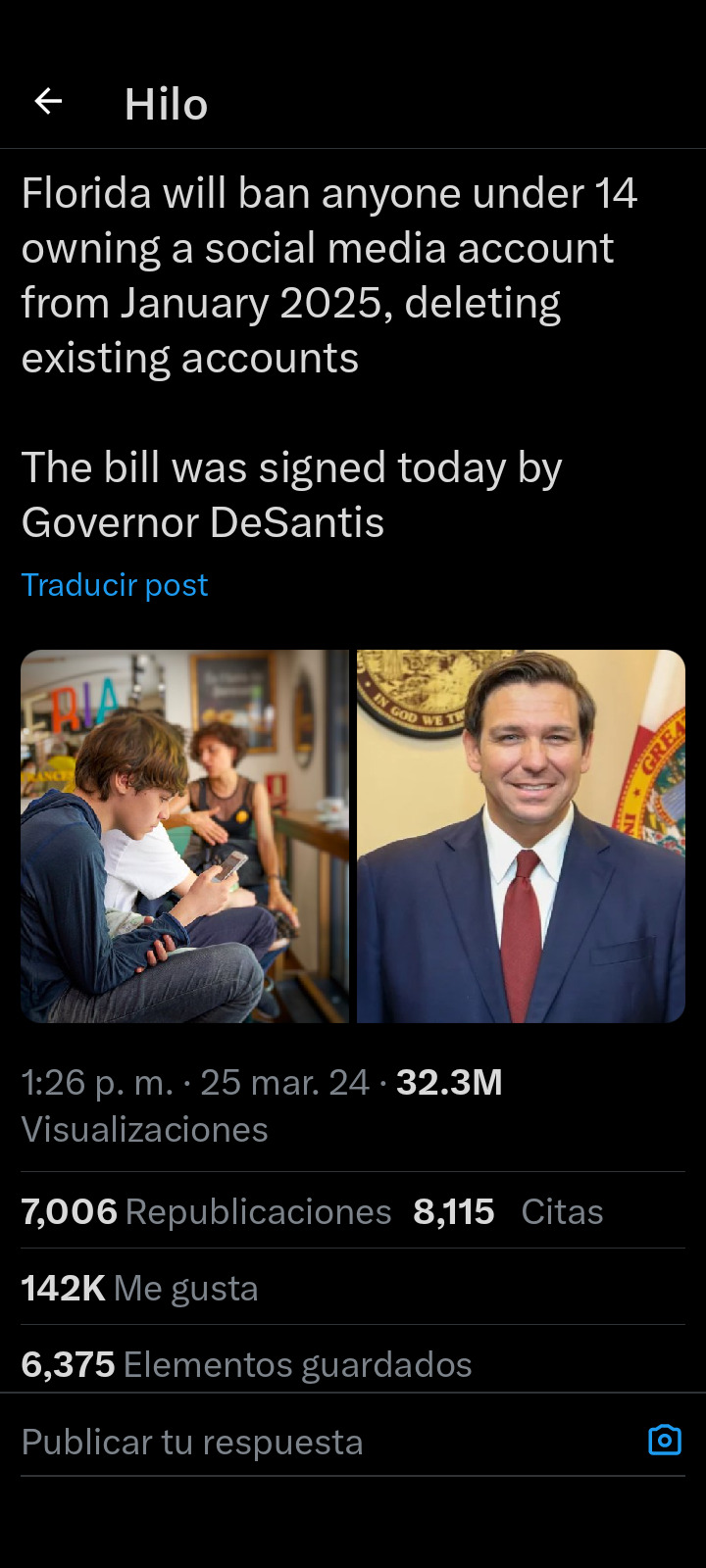

So many people have held back on speaking out against KOSA or signing petitions because "it probably won't pass." But we have proof that it very well can and will.
So what can we do right now?
The same thing we've been doing: bring awareness and protest.
Here are a few websites you can visit to sign petitions:
https://www.badinternetbills.com/
https://www.stopkosa.com/
https://www.eff.org/deeplinks/2024/02/dont-fall-latest-changes-dangerous-kids-online-safety-act
You can also call your state reps. This post explains how you can do that.
Good luck, everyone! Don't give up yet.
27K notes
·
View notes
Text
Hello everyone! California's Suspense day has come and gone and we have the results of bills being voted on in the Suspense File! And here's how it went!
Held in Committee (bills do not pass and are dead for the year):
SB 1228 (large online social media platform ID verification) and SB 1444 (requiring social media platforms to have third party software available to allow monitoring of minors online)
Passed:
SB 976 (Protecting Kids From Social Media Addiction Act) and AB 1949 (broadening regulations on collecting personal information of consumers less than 18 years of age)
We've got two down on suspense and still a few to go! (AB 3080 did not go through the Suspense File and passed through to the Senate under a regular hearing)
And SB 976 did have two dissenting votes against 5 yeas, so we know there's definitely some opposition there! So there's still hope of stopping it leaving the Senate!
The last day for each bill to pass through its house of origin is May 24.
So let's keep on calling those reps about SB 976, AB 1949, and AB 3080! Let them hear our voices loud and clear so that they know we mean NO!
Sources:
CA Assembly Suspense File Unofficial Results
CA Senate Suspense File Official Results
40 notes
·
View notes
Text
If you want to do a little extra to help us protect our internet rights and help us further a future with a free internet, here's a list of the proposed bills which will be going to committee on the 17th. If you'd like to add some into your calls, or make a few calls on ones you think could be important to help, here's some information!

The American Privacy Rights Act has only just been introduced as a concept, and there's not much information on it at this moment as it's not been introduced as a proper bill yet. However, it does show some promise, as it appears to intend to extend consumer privacy rights over their personal data, as well as prohibit certain data transfers without a user's express permission among other things. Keep an eye on this one but it does appear to be a potential positive.
VOTE NO
H.R. 7891: KOSA (The Kids Online Safety Act). High priority NO vote. Increases internet surveillance and has high risk of internet censorship.
H.R. 7890: COPPA 2.0 (Childrens Online Privacy Protection Act amendments). Claims to protect children and push parental oversight but also requires additional data collection and storage.
H.R. 5778: Sammy's Law of 2023/Let Parents Choose Protection Act. Requires large social media platforms to have access to applications that will allow parents to track the things that their children interact with on social media. Increases tracking and sensitive data collection, allows higher parental curation/tracking and privacy breaches of their children, restricts internet navigation.
H.R. 6149: Protecting Kids On Social media Act. Prohibits kids under 13 from using ad-based social media (already required in the TOS of many social media platforms). Claims to not require age verification through third party means or otherwise, but highly likely that this could end up being the case as the easiest solution.
H.R. 6429: The SCREEN Act (Shielding Children's Retinas from Egregious Exposure on the Net Act). Purports to be a bill meant to prevent teenagers and children from accessing pornography online. Mandates pornographic websites to have strict age verification to prevent minor access (again, more unsafe and unconstitutional age verification possibilities). The terms of the act include not even strictly sexual content but also that which is deemed "obscene". Which could be dangerous in the hands of someone who might consider completely normal LGBT+ images and content to be such. (Very similar to the law that was just passed in Texas regarding such sites).
VOTE YES
H.R. 5628: The Algorithmic Accountability Act of 2023. Takes automated decision making software and promoted regulation to ensure safety, fairness, and ethics in AI tools.
H.R. 4311: The DELETE Act (Data Elimination and Limiting Extensive Tracking and Exchange Act). Data privacy law. Allows individuals to submit for their data to be mass deleted from data brokers in order to maintain their privacy.
H.R. 4568: The TLDR Act (Terms-of-service Labeling, Design, and Readability Act). Requires commercial websites and apps to have plain language TOS available before users agree to them. (Language currently does not include small websites/websites for small businesses).
H.R. 5534: Banning Surveillance Advertising Act of 2023. Bans targeted advertising using personal data like that which can be purchased from data brokers or based on protected class. Would allow contextual/targeted ads based on broad location.
If there's any further context anyone has for any of these bills, or anything I may have missed that could shift bills from one category to the other, please let me know.
Another KOSA update:
Sadly, it is true that today, 04/10/2024, KOSA has been introduced to the House BUT! That doesn’t mean it’s game over just yet!
Proof:
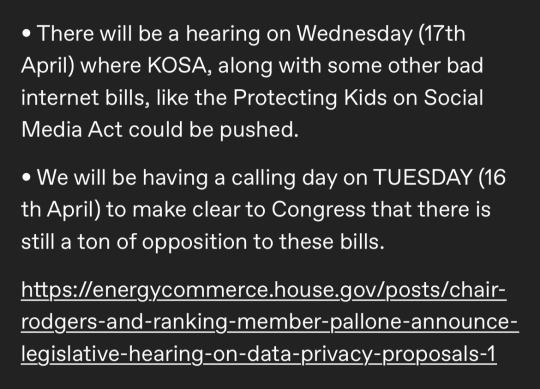

Friendly reminder that there is much less support for KOSA in the House than the Senate. And even if it does pass the House—God forbid, it’s not over until the President signs it.
Here is the phone number for the Committee that’ll be holding the hearing on April 17th (Use the top number), and of course keep calling your Senators & House Representative.

I know this is scary for a lot of people, but we have to keep fighting. Please spread this around & don’t give up!

Don’t lose hope.
KEEP FIGHTING.
6K notes
·
View notes
Text
Real Estate Revolution: 7 Powerful Ways AI Transforms the Industry!

From Guesswork to Intelligence: A Realtor’s Journey with AI in Real Estate
It was a humid Monday morning when Meera, a 32-year-old real estate agent in Kochi, stared at her spreadsheet of unsold properties. Despite her relentless effort — calls, site visits, newspaper listings — something felt outdated. Clients wanted more than square footage and location; they wanted personalization, insights, speed.
That’s when Meera decided to give Artificial Intelligence a shot.
The First Spark: Smarter Listings Her journey began with AI-enabled property portals. Instead of static listings, these platforms learned about the buyer. One client who initially searched for 2BHK apartments near schools was also shown gated villas near tech parks — because the AI recognized his browsing habits and income patterns. He booked a site visit the same day.
For the first time, Meera saw how AI could understand buyers better than they understood themselves — a game-changer in real estate.
Numbers That Spoke Volumes A week later, Meera used an AI-based pricing tool. She uploaded photos, property age, area, nearby amenities — and out came an estimated market value, rental potential, and price flexibility range. She was stunned.
Earlier, price negotiation felt like a gamble. Now, with machine learning models tracking market behavior, seasonality, and neighborhood demand, she could speak numbers with confidence. The AI wasn’t just helping her sell — it was helping her sell smart.
A Tireless Assistant Her next discovery was an AI-powered chatbot on her agency’s website. This digital assistant could answer 80% of the queries — location, EMI estimates, floor plans, virtual tours — while Meera focused on high-value clients.
When she closed her first deal fully online through that assistant, she didn’t feel replaced — she felt relieved.
It was clear: in the modern world of real estate, AI wasn’t about automation — it was about augmentation.
Beyond Sales: Helping Builders and Developers Meera soon found herself working with a local builder. “Where should we build next?” he asked. She turned to AI’s predictive analytics.
The software processed traffic trends, land prices, school zones, office expansion zones, and even social media buzz. Within days, it suggested three micro-locations ripe for growth.
For Meera, this wasn’t just a sale. It was real estate strategy at a whole new level.
Paperwork? Streamlined. Another problem: paperwork. KYC, lease drafts, buyer IDs — all of it piled up. AI document verification tools began scanning, flagging inconsistencies, and storing them securely. No more late-night proofreading or legal hiccups.
In real estate, where legal missteps can mean massive losses, this felt like having a lawyer and a filing clerk rolled into one.
Trust Built on AI What about fraud? Meera had lost a client two months back to a fake listing on a rival site. Now, AI fraud detection scanned listings for duplicate images, inconsistent metadata, and red flags in seller profiles. It brought a new sense of security — for both agents and clients.
In a field like real estate, trust is everything. And AI helped her build it.
The Bigger Picture Soon, Meera was onboarding NRI clients — people who couldn’t visit properties but wanted real estate investments in Kerala. AI tools helped her translate trends, localize insights, and provide virtual walkthroughs. Geography no longer limited her sales.
For deeper insight into how AI is transforming the future, click the link below:
Conclusion: A New Era Begins Today, Meera doesn’t chase leads with flyers or wait endlessly for callbacks. She lets Teemify’s intelligent agent handle the patterns — automating follow-ups, sorting qualified leads, and even scheduling property walkthroughs — while she focuses on building real relationships. Her revenue is up. Her hours are better. And her clients? More satisfied than ever.
AI didn’t change what she did in real estate. Teemify changed how she did it — intelligently, efficiently, and effortlessly.
#realestateinnovation#aiinrealestate#proptech#artificialintelligence#futureofrealestate#intelligentrealestate#realestatetech#smartrealestate#realestatedigitaltransformation
1 note
·
View note